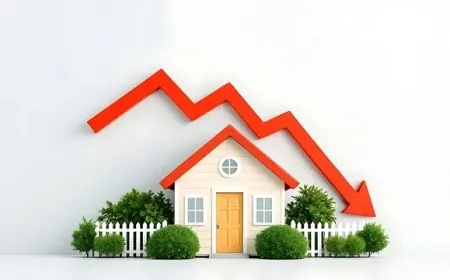U.S. Existing Home Sales Show Dip, But Annual House Price Decline Slows Amid Housing Shortage
The recent U.S. existing home sales report, revealed a 3.3% decline in June, reaching a five-month low due to a housing shortage. Explore insights on annual house price decline and its impact on the market.

In a challenging housing market, U.S. existing home sales encountered a setback, reaching a five-month low in June due to the ongoing scarcity of available homes. However, there is a glimmer of hope as the pace of annual house price decline showed signs of easing during the same period.
According to a report from the National Association of Realtors, existing home sales witnessed a 3.3% drop in June, reflecting a seasonally adjusted annual rate of 4.16 million units. This figure marks the lowest level since January. Although economists polled by Reuters had previously projected a slightly higher rate of 4.20 million units for home sales, the market conditions played a role in the observed decline.
The sales performance varied across different regions of the country. The Northeast region experienced a rise in home sales, while the Midwest remained unchanged. In contrast, sales in both the West and the densely populated South declined during this period.
The housing market relies heavily on home resales, which registered a significant decrease of 18.9% on a year-on-year basis in June. While recent data, such as building permits and homebuilder sentiment, suggests that the housing market may have bottomed out following the impact of aggressive interest rate hikes by the Federal Reserve, the ongoing shortage of homes for sale remains a constraint, potentially limiting the scope of a swift rebound.
The average rate on the popular 30-year fixed mortgage remains close to 7%, based on data from mortgage finance agency Freddie Mac. As a result, many homeowners are choosing to stay in their current homes for more extended periods, contributing to the tight housing supply.
Although builders are increasing their production efforts, they continue to face obstacles due to shortages of critical materials like electrical transformer equipment. Additionally, higher borrowing costs and limited availability of land continue to challenge the housing market.
The data further revealed that the number of previously owned homes available in June saw a notable decline, dropping by 13.6% from the previous year. At the current sales pace, it would take approximately 3.1 months to deplete the existing inventory of homes. This figure reflects a slight increase from 2.9 months compared to the same period last year. The housing market typically aims for a four-to-seven-month supply, which is considered a healthy balance between supply and demand.
In terms of pricing, the median existing house price experienced a slight decline of 0.9% from the previous year, settling at $410,200. However, there was a 3.5% increase in the median house price compared to the previous month, indicating some fluctuation in pricing trends.
Lawrence Yun, the chief economist at the National Association of Realtors, highlighted the continued challenge of limited supply in the market. He stated that this scarcity has led to multiple-offer situations, with one-third of homes selling above the list price in the latest month.
The market data also revealed that properties tended to stay on the market for an average of 18 days in June, a slight increase from 14 days a year ago. Approximately 76% of homes sold during the month were listed for less than a month. However, the percentage of first-time buyers decreased slightly to 27%, down from 30% in the previous year.
All-cash sales constituted 26% of transactions, slightly higher compared to 25% in the previous year. Distressed sales, including foreclosures, represented 2% of transactions, remaining unchanged from May. These figures highlight the overall market dynamics amidst the ongoing housing shortage.
Also Read: The Importance of Flood Insurance: Protecting Homes in the Face of Devastating Floods
































































